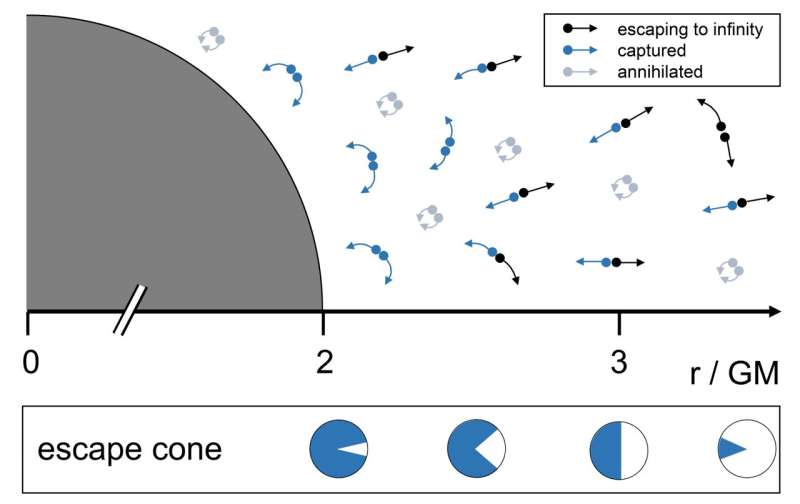This article has been reviewed according to Science X's editorial process and policies. Editors have highlighted the following attributes while ensuring the content's credibility:
fact-checked
peer-reviewed publication
trusted source
proofread
Black hole evaporation: Theoretical study proves Stephen Hawking partially correct

New theoretical research by Michael Wondrak, Walter van Suijlekom and Heino Falcke of Radboud University has shown that Stephen Hawking was right about black holes, although not completely. Due to Hawking radiation, black holes will eventually evaporate, but the event horizon is not as crucial as had been believed. Gravity and the curvature of spacetime cause this radiation too. This means that all large objects in the universe, like the remnants of stars, will eventually evaporate.
Using a clever combination of quantum physics and Einstein's theory of gravity, Stephen Hawking argued that the spontaneous creation and annihilation of pairs of particles must occur near the event horizon (the point beyond which there is no escape from the gravitational force of a black hole).
A particle and its anti-particle are created very briefly from the quantum field, after which they immediately annihilate. But sometimes a particle falls into the black hole, and then the other particle can escape: Hawking radiation. According to Hawking, this would eventually result in the evaporation of black holes.
In this new study the researchers at Radboud University revisited this process and investigated whether or not the presence of an event horizon is indeed crucial. They combined techniques from physics, astronomy and mathematics to examine what happens if such pairs of particles are created in the surroundings of black holes. The study showed that new particles can also be created far beyond this horizon. Michael Wondrak says, "We demonstrate that, in addition to the well-known Hawking radiation, there is also a new form of radiation."
Everything evaporates
Van Suijlekom says, "We show that far beyond a black hole the curvature of spacetime plays a big role in creating radiation. The particles are already separated there by the tidal forces of the gravitational field." Whereas it was previously thought that no radiation was possible without the event horizon, this study shows that this horizon is not necessary.
Falcke says, "That means that objects without an event horizon, such as the remnants of dead stars and other large objects in the universe, also have this sort of radiation. And, after a very long period, that would lead to everything in the universe eventually evaporating, just like black holes. This changes not only our understanding of Hawking radiation but also our view of the universe and its future."
The study was accepted for publication in Physical Review Letters, and in the meantime, a version of the paper can be read on the arXiv preprint server.
More information: Michael F. Wondrak et al, Gravitational Pair Production and Black Hole Evaporation, Physical Review Letters (2023). DOI: 10.1103/PhysRevLett.130.221502 , journals.aps.org/prl/abstract/ … ysRevLett.130.221502
On arXiv (2023). DOI: 10.48550/arxiv.2305.18521
Journal information: Physical Review Letters , arXiv
Provided by Radboud University Nijmegen





















